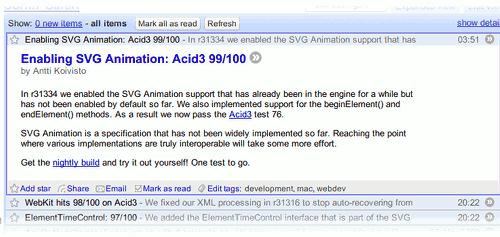To Γαλλικό 'digg-esque' fuzz.fr καταδικάζεται
Στις 27 Μαρτιόυ 2008 η υπόθεση ενός γαλλικού 'αντίγραφου' του γνωστού Digg, του Fuzz.fr (πλεόν εκτός λειτουργίας) εκδικάστηκε στο Tribunal de Grande Instance de Paris για παράβαση της ιδιωτικότητας του ηθοποιού Olivier Martinez. Ο ιστότοπος, παρόμοιος με αρκετούς άλλους, τόσο στις ΗΠΑ όσο και σε Ευρωπαϊκές χώρες, επέτρεπε στους επισκέπτες του να καταχωρίσουν τις διευθύνσεις ενδιαφέροντων άρθρων και να ψηφίσουν, δημιουργώντας ένα 'κοινωνικό' πρωτοσέλιδο με τα δημοφιλή άρθρα όπως ορίζωνται εκείνη τη στιγμή από τους χρήστες του. Στη συγκεκριμένη περίπτωση φαίνεται πως κάποιο άρθρο εμπεριείχε φήμες για τη προσωπική ζωή του εν λόγω ηθοποιού. Δυστυχώς, το δικαστήριο απεφάνθη πως οι ιδιοκτήτες του ιστότοπου θα έπρεπε να είχαν αποτρέψει τη δημοσίευση του συνδέσμου προς το επίμαχο άρθρο, παρά το γεγονός πως η διαδικασία ήταν καθ'όλα αυτοματοποιημένη και τα άρθρα επιλέγονταν από τους χρήστες και όχι το προσωπικό του ιστοτόπου. Δε γνωρίζω εαν πριν προχωρήσει σε νομικές διαδικασίες εναντίον του fuzz.fr ο εν λόγω ηθοποιός είχε ενημερώσει τον ιστότοπο σχετικά με το περιεχόμενο αυτό και εαν ναι ποιά ήταν η αντίδραση των ιδιοκτητών του. Όπως και να έχει θεωρώ πως είναι μια ιδιαίτερα ενδιαφέρουσα υπόθεση που μας αφορά άμεσα και δυστυχώς απειλεί μια ολόκληρη κλάση εφαρμογών βασισμένων στη κοινωνική συνεισφορά και αλληλεπίδραση μεταξύ των χρηστών και ίσως αποτελέσει αποτρεπτικό παράγοντα για νέες προσπάθειες στον χώρο. Περισσότερα εδώ [στα γαλλικά]
Update: Δείτε και το σχετικό άρθρο από τη Le Monde [στα γαλλικά] καθώς και το αναλυτικό άρθρο του Νίκου Σμυρναίου.

 These past few days there's been a flurry of WebKit posts over at Surfin' Safari about its ACID3 performance. I guess when dealing with bugs, and given the fact that Microsoft typically needs around 5 years before simple CSS1 bugs are fixed (as an aside the first and only version of Internet Explorer to date that
These past few days there's been a flurry of WebKit posts over at Surfin' Safari about its ACID3 performance. I guess when dealing with bugs, and given the fact that Microsoft typically needs around 5 years before simple CSS1 bugs are fixed (as an aside the first and only version of Internet Explorer to date that